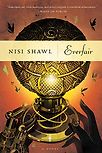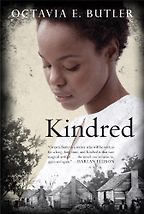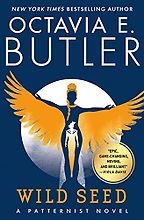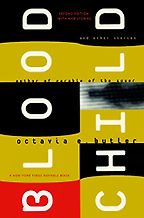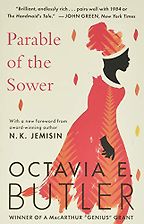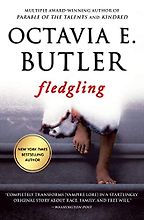Let me start with a very general question. Who was Octavia Butler, and why do you think her books have been so influential in the world of science fiction and fantasy—and literature more generally?
Who was she? I could write a book about that—others already have. And I’ve contributed to those books. But to me, she was a gracious, wise, kind, and compassionate friend. That’s what I knew her as, a beautiful person inside and out, whose work was challenging and dangerous. And I think that gets to why she is so influential. She took risks, big risks, and she allowed people to come along with her as she took those risks, so you had the thrill of participating in the audacity of what she was writing. You have the thrill of undergoing the dream state that she was in as she was writing, and the results of those really vivid dreams.
Through her writing life she won pretty much every prize going: a MacArthur Fellowship, Hugo Awards, Nebula Awards, Locus Awards…
I think that she has achieved the fame that she deserves, to an extent. NASA named a feature of Martian topography after her. I think that’s a good milestone. But that’s not the end. She needs to be famous throughout the globe, in the same fashion that you can go to Nepal and people know who Mickey Mouse is. You need to be able to go anywhere and for people there to know who Octavia Butler is. That’s what I think.
I’ve read that she herself said that she ‘wrote herself into’ the science fiction and fantasy literature as an African-American. She wrote books with Black protagonists. How significant was that for her time?
It was incredibly significant. It was really going against the tide. There are countless Black people who were writing at the same time who were breaking down barriers. Famously, Samuel R. Delany was a pioneer. But there were only a few, just one or two people trying to prove that this speculative fiction field was as diverse and wide as humanity. She was she was a big part of that. I would say, like, 90% of it.
You’ve selected five of her best books. During her lifetime, she was rather prolific and published 12 novels and one short story collection. Let’s talk about Kindred first. This was a big bestseller on publication. Could you talk us through the book, and then why you think it was one of Butler’s best?
Well, I just will say that I’ve selected these books as the best introduction to her work, not as her best work. We writers like to make those sorts of lawyerly distinctions.
I selected Kindred because it is one of two portals to her work that most people come across, and she wrote it to reach a certain audience. Kindred is the story of Dana, a 1970s African-American woman—‘black’ as she calls herself at the time—who is drawn back through time to preserve the life of one of her ancestors who is white and a slave owner in the South. And over a number of confrontations with him, he grows, he becomes increasingly dangerous to her and she eventually comes out of this situation physically maimed and intellectually changed. In the 1970s she’s married to a white man—again, very revolutionary for the time to be writing about this—and her husband goes back with her on one of these chronological jaunts and he also has a very disturbing experience there. That’s all I can say without spoiling it, but it’s hopefully enough to entice people.
Get the weekly Five Books newsletter
I wrote about it for Tor.com; I called it ‘Grandmother Paradox’ because the ancestor who needs to be born before Dana can give up on saving the slave owner’s life is her great-great-grandmother. So that’s a little bit about how the book goes. It works so well because the initial impetus for the book was that Octavia was upset with her contemporaries in college, who downplayed the rigors that their enslaved ancestors endured and denigrated them as Uncle Toms and as kow-towing too easily to white oppression. And she wanted to show them that, actually, they too would have been right there in the kitchen, begging for scraps. I think that that’s why it’s so effective, because it is written with a mission to show something to people that they were ignorant about.
It’s appeared once before on our site. Annalee Newitz selected it as one of the best time travel books, saying that it’s “a great metaphor for why we get emotionally bribed into participating in systems that oppress us.” Do you agree with that take on it?
I can see that. But I don’t think of it as emotional bribery. I think it’s a question of survival: ‘I will not exist if this does not happen.’ It is a good metaphor for emotional bribery, but it’s also just a question of existence.
That question of survival, and the moral ambiguity that comes with it, seems to be a theme that Butler returned to again and again.
That was one of the knotty complex problems that she turned her mind to all the time.
You alluded there to the Black Power movement, which was becoming established when she was a teenager. Do you think Butler saw her own writing as a form of activism?
I don’t believe I ever heard her say that she felt that her writing was part of the Black Power movement. But I do understand her take on it as complementary, if that makes sense, supporting it and accompanying it. She was not illustrating points of the movement, but she was responding to the atmosphere that the movement created.
That makes sense. Perhaps we can talk next about Wild Seed, which is your second choice. And it’s also the fourth book in the Patternist sequence. Before we talk about Wild Seed, specifically, could you very briefly give us an idea of what the Patternist series is?
The Patternist sequence is a very long-ranging, inter-generational saga in a period of science fiction when we talked about something we called psionics. This was a sort of pseudo-rational label for mental powers such as telepathy and telekinesis, and at the time the US and the USSR were engaged in serious research on the topic, so it had that sort of cachet. The Patternist series goes from the intentional breeding programs that are covered in Wild Seed through interstellar empires of telepaths. The books were achronological, or published out of order.
“She needs to be famous throughout the globe, in the same fashion that you can go to Nepal and people know who Mickey Mouse is”
I picked Wild Seed in particular, because that is one of the other portals that people have to Butler’s work. Kindred is often assigned reading in college classes, sometimes even the later years of high school in the US. So people come across that as part of a curriculum. But Wild Seed is something that people find on their own, generally. The people that I know that have read Wild Seed first came across it as if it was a sudden secret revealed to them on the racks of the store, in the book section. And it works as an introduction. Not just because, although it’s the fourth book published in the series, it’s earliest in the timeline. It works because people I think, really identify with Anyanwu.
The story is that of an African woman, Anyanwu, who is immortal in her own body and can also jump from body to body—put her consciousness into other beings, a dolphin, for instance. But she encounters someone who is similar in power to her but not as benevolent, Doro. And Doro is immortal because he leaps from body to body, and when he leaves a body, it dies. And when he goes into a new body, the original consciousness is ejected and dies. So he’s a serial murder who lives immortally, and he has breeding programs to try and uplift other creatures, other humans. Anyanwu becomes an unwilling participant. I’ll just leave it there.
I’ve heard people discuss these two characters as prototypes: female nurture and male destruction, equal and opposites. Does that sound right to you?
It’s perhaps a little more nuanced than that because Doro sometimes takes over female bodies. So, although identifying as male, he’s not 100% male. There’s also the idea, not just of nurturing, but interconnection, which I think Anyanwu personifies. It’s not just that she’s caring for herself and her children, she’s caring for and reaching out to and being cared for by the community.
That sense of parasitism is common to the third book recommendation you made, Bloodchild and Other Stories, a collection of short stories. The title story, published in 1984, won Nebula, Hugo, and Locus Awards, as well as a Reader’s Choice Award. You can read it in an hour or less. Why is ‘Bloodchild’ so powerful?
Oh, because it gets to the root of so many human fears. Again, to me it exemplifies Butler’s concern with moral ambiguity and survival. The entire book of short stories is worth reading, but that particular short story deals with an abandoned human colony on a planet circling another star, and the humans who have been abandoned there are dealing with sentient beings that lay their larvae in living organisms. They’re called the Tlic. They find that humans are the best organisms to use. It’s so great that these gift cribs have come from the stars.
And there are all sorts of factions among the Tlic. One faction is like, ‘Let’s just keep them in cages and corrals, and let’s just impregnate them with our larvae and life will go on and it’ll be good for us.’ And then there are others who are like, ‘Well, you know, actually, they’re sentient too. And maybe they should have a little choice in this.’ There’s that kind of tug of war.
Five Books interviews are expensive to produce. If you're enjoying this interview, please support us by donating a small amount.
And then there’s a tug of war in within the human community as well, you know, ‘Should we collaborate with these horrible monsters? It’s true that they give us these narcotic effects when they insert their larvae into us. But maybe we’re better off without that.’ So, there’s a tension there as well, in this particular short story. Because it’s a short story, it can’t be as sweeping as a novel. It just focuses on that conflict in the person of Gan, who is selected to bear the larvae of a long-time Tlic friend of the family. I think it’s such a fraught picture, and it’s gory. But it’s gorgeous, also.
Yes, there are such big ideas in this story. I came across a term, ‘cognitive estrangement’: the idea that sci-fi helps people think deeply about issues that they might be resistant to consider in a normal context. Ethics through the medium of aliens. Do you agree with that term, and would you take that approach to Octavia’s writing?
Yes. That’s a term that was created by Darko Suvin. That is a very helpful critical tool for analyzing science fiction, the idea that you’re making something about aliens, but the core is about humanity, that there are these questions that you can look at more objectively when they’re couched in terms of another time period, another place, that sort of thing.
Are there any other stories that you particularly recommend from this collection?
I am just so in love with the story, ‘The Evening and the Morning and the Night’, which has a lot to do with disability studies, in my opinion, because it’s about a new disease. It’s about a new genetic disorder that is caused by trying to treat cancer, basically. And it’s a horrific disease. I understand that Octavia modelled it on Huntington’s, but she put in some auto-cannibalism.
It deals with hope in the face of these situations. When we talk about disability in science fiction, there are so many ways of looking at that intersection. Things that are a disability in one environment on Earth may not be a disability in the asteroid belt; things that are normal on Earth might be a disability in the asteroid belt. New technical solutions for one problem give rise to another problem. There are all sorts of ways of looking at that intersection. And I think that ‘The Evening and the Morning and the Night’ does it very powerfully.
Thank you for that recommendation—it’s not one that I’ve read. And maybe that question of benefits and drawbacks of disabilities carries on into your next choice: The Parable of the Sower. Here the female protagonist is an ‘empath’, which means she feels what other people are feeling, very powerfully. That’s a sort of superpower, but it’s also something that causes her a great deal of problems. Could you could you tell us about The Parable of the Sower?
I believe that’s the one that actually made the New York Times bestseller list, finally, ten-to-fifteen years after Octavia’s death? The Parable of the Sower is the origin story of Lauren Oya Olamina, who has this disability of feeling other people’s feelings. Her boundaries are really gone. She’s suffering from this disease and living in a gated community, as the world around the gated community slowly crumbles away.
People make a big deal out of the fact that the president at the time is running with the slogan, ‘Make America Great Again’, which was Donald Trump’s cry. People see that as prescient, but I believe she was modelling him more on Ronald Reagan, whom she absolutely loathed. It’s a world where police services are contracted out privately. Health services, ditto. Basically, the middle class is gone. In other words, it’s kind of what’s happening now financially, economically, and socially, although it’s slightly more advanced than what’s going on now. At one point, the gated community that Lauren is living in is overrun. She hits the road with some of the survivors of that overrunning.
The thing that struck me most about the book, which I only read relatively recently, was how near-future it is. I’d been expecting dystopia. And it is a dystopia, but it’s also a dystopia that feels only a few steps from here. It’s set in a semi-recognisable America.
Only a few steps. She was somewhat pessimistic, as you can tell by that novel, but I think that one of the things that makes it so compelling is not just that there are these horrible things happening, but that they are horrible things that are not that far removed from what’s going on now. Isn’t that how it felt to you?
Yes, definitely. There are still hospitals, but you probably can’t afford to use them. There are still police, but it’s simply not worth your time to call them.
Speaking as a Black person here—yes, it’s just not really worth the time. It’d be nice if there was someone else that could actually help.
In all of these stories, I think that what’s key is being able to get people to identify with the protagonist. The protagonist here is a Black woman. I’ve been talking with Gerry Canavan, who wrote one of the best books on Butler. Gerry was talking about how in the Huntington Archives, there are all these notebooks that that Octavia wrote while she was creating these books. Her take on Lauren Oya Olamina was that this is a killer. Lauren cannot stand to see people suffer, so she can’t go and punch someone for kicking a puppy; she has to shoot that person for kicking the puppy, because otherwise she’ll feel the pain of them being punched, and then they’ll go kick the puppy again and she’ll feel that pain too. She has to cut it off. So in some ways, the so-called ‘empathy disease’ makes her ruthless.
Butler introduces that element quite gently. Lauren begins by euthanizing people, essentially, and so you go along with her for the ride, right?
Exactly. But you know, I was kind of there already. There’s no problem in my mind with identifying with someone that ruthless.
Absolutely. And the other Parable books?
There’s only one other that’s been published, The Parable of the Talents, which is more told from Lauren’s daughter’s viewpoint. Octavia made several attempts to write a third, Parable of the Trickster, but was never satisfied with whatever she wrote. She intended to write more, but found herself confounded.
Maybe that brings us to our final book choice. You’ve recommended Fledgling, her final novel, and one that I think she regarded as her ‘fun’ novel. Do you think it’s a fun novel?
Yes, very light—her idea of ‘light and frothy’ is dealing with things like race, murder, and entitlement! I picked this one because it’s my favourite. And I really regret that she did not go on to write more and more about Shori. There are people who have a tough time with this, which is also why it’s the final book that I recommend. Shori is a vampire. She’s not human. She’s a vampire who has been genetically modified to have additional melanin, which was taken from people of Black heritage. This allows her to withstand daylight. And that is a big thing for vampires. It gets rid of one really crucial weakness.
So the book opens with Shori recovering from a raid by white supremacist vampires who have destroyed her home and her family. And it ends with her proving in a court of vampires that she is a pure vampire, despite this addition of melanin from Black humans. And there are quite a few adventures in between. She acquires what you could call a ‘harem’ of food sources—she feeds off of humans and they get pleasure from that, and so does she. She starts out with a white man.
“There are these questions that you can look at more objectively when they’re couched in terms of another time period, another place”
And the problem for many readers is that Shori appears to be 12 years old. She appears to be a pre-adolescent human. Very early in the book, she’s engaging in sexual activity. Shori is actually 53, I believe—in her fifties. So, no problem there. But, again, there’s this sort of moral tension around whether this is really about a precocious child, or is this about pedophilia, or is this about a 50-year-old? Because the other thing is that at 53 a vampire is not yet an adult? It’s kind of fraught.
I get the picture online that this pseudo-paedophilic aspect gets a very mixed reaction from a lot of readers. So you’ve got to go into the book knowing what to expect, right?
Yes. And it’s not for everyone. I have good friends who will not read it. But what’s happening in this is a discovery of identity that I find just incredibly moving. And I identify with it as someone who went through the same process as a teenager—the process of discovering myself, discovering that I was not like everybody else. Because Shori isn’t just a vampire. She’s a really different kind of vampire.
Absolutely, and I think just to sort of close up our discussion, I just wanted to come back to that idea of why we should read Octavia Butler now. Would you mind talking a little more on that? Why her writing continues to be relevant today?
I think she’s always going to be relevant. I trip up a little on the idea of why we should read her now. I mean, we should be reading her far into the future. Why should we be reading her now? Because now is when you can start.
There is a movement in science fiction and fantasy, just a real burgeoning, a blossoming of marginalised voices coming to the fore. And so if you want a sense of what that’s like, then you need to read some Octavia Butler. There are people winning Hugos and, and Nebulas, people whose work is now being adapted to comics, to TV series, to films, that would never have been published before. So in order to get a context for that flowering you should be reading some Octavia because she started that.
Since Octavia’s death there has been a debate as to who is ‘the next Octavia.’ And I find that incredibly disgusting as an idea. It boils down to a kind of tokenism. You will find people saying that Nisi Shawl is the next Octavia, or that N. K. Jemisin is the next Octavia, or maybe Nnedi Okorafor. I just want to say: No! Unless we’re all Octavias, there’s no new Octavia.
October 20, 2021. Updated: August 10, 2022
Five Books aims to keep its book recommendations and interviews up to date. If you are the interviewee and would like to update your choice of books (or even just what you say about them) please email us at [email protected]

